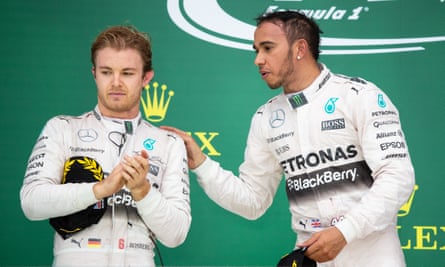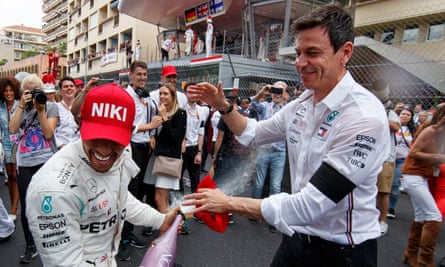“F1 Racing Confidential” takes a behind-the-scenes look at the world of Formula One, featuring the well-known names of Toto Wolff and Lando Norris, as well as the unsung heroes such as engineers and strategists who play a crucial role in the success of the sport.
Toto Wolff explains that one of the traits of his personality is that he tends to take things personally, which can be both beneficial and challenging. When he became a part of the team, it became like a family to him and he devoted all his time and energy to it. He was fully invested in the well-being of his team and their success.
At the age of 52, Wolff leads the Mercedes team, which has consistently ranked at the forefront of F1 and is also striving to reclaim its previous success. When he first joined in 2013, the Mercedes High Performance Powertrains engine facility in Brixworth had a staff of approximately 520 people, while the Mercedes F1 team had 660 employees. Today, the total number of staff in the organization has grown to 2,500, and sponsorship revenue has increased from £50m per year to over £300m. However, Wolff maintains that despite these advancements, he approaches the challenge and competition with ease.
He claims to have never experienced pressure. He makes calculated choices that allow him to handle the worst possible outcome. If the worst outcome would significantly impact his life, he would not make that decision. Even during challenging times that everyone faces, being in Formula One feels easy in comparison.
After joining Mercedes, Wolff facilitated Lewis Hamilton’s move from McLaren. Hamilton would go on to win a championship in 2014 and secure five more by 2020. During this time, the team also achieved eight constructors’ championships between 2014 and 2021. However, managing the relationship between two drivers is crucial in a team. Before his role at Mercedes, Wolff was involved in driver management as co-owner of a sports management company, representing drivers such as Pastor Maldonado, Bruno Senna, Rubens Barrichello, and Nico Hülkenberg with the goal of advancing their careers. At Mercedes, his role has been significantly different.
Wolff applied his core belief in prioritizing the team above all else. He reflects, “As Lewis and Nico [Rosberg] were both established stars and I was a newcomer to F1, it was a unique journey for me. However, from the start, I made it clear to them and to all that I do not view them as two exceptional individuals; rather, I see every single employee as a superstar. There is no distinction between the drivers and any other team member.”

In 2014, Hamilton and Rosberg had confrontations on the track during races in Belgium and Monaco. Tensions continued after Hamilton won the title in Texas in 2015, and famously, they caused a collision in the race in Barcelona in 2016. This was the same year that Rosberg would ultimately win his only championship. Despite being friends in their karting days, their relationship deteriorated as they competed for the title. Both are strong-willed individuals who are not easily controlled.
Wolff acknowledges the presence of ego, but also recognizes its value as a powerful motivator. However, he emphasizes the importance of directing and moderating ego. He believes that top performers possess ego and have distinct qualities that contribute to their strength.
In addition, he believes that being straightforward and truthful is essential, which he had to emphasize from the beginning of his time at Mercedes by sharing some difficult realities with the Mercedes-Benz board. When Wolff was the executive director at Williams, he was tasked with evaluating the team in the summer of 2012, particularly regarding their lack of success after acquiring the brand from Brawn. His findings were not well received by the board.
“I informed them that while I am managing the same budget at Williams, my expectation is for a top six placement. However, their expectation, despite having the same budget, is to be world champions. This disparity is what needs to be addressed,” he stated. “They were quite upset, but I reminded them not to take it out on the messenger…”
“When I arrived, I informed Mercedes that we needed a budget comparable to our top competitors, Ferrari and Red Bull. While I cannot promise this will secure us the championship, I can assure you that without it, victory is unlikely. The board responded by asking, ‘What do you require?'”
The cost may not have been part of the initial Mercedes plan, but the incredible success that followed surely compensated for it. Wolff exhibited the same level of critical honesty that he had applied to his own professional journey. He was born in Vienna in 1972 but did not have a passion for motor racing until the age of 18 when he stopped at the Nürburgring with friends and witnessed an F3 race. “I distinctly remember walking onto the grid and standing next to those F3 cars, and I was completely taken aback. It was at that moment that I realized this was what I wanted to do,” he recalls. He describes it as “the moment I discovered my true identity” and was completely enthralled by it. “I don’t recall watching the actual race, but it was the drivers, in their cars on the grid, ready to go, that caught my attention,” he says. “I immediately wanted to do it myself, but I had no idea where to even begin.”

Wolff’s approach was to dive headfirst into the task at hand. He secured sponsors, purchased a Seat Ibiza, enrolled in the Walter Lechner racing school, and hit the racetrack. He later switched to a Formula Ford 1600, but his luck ran out at the first race in Brno. A collision with another car after spinning out left him with broken fingers and a trip to a hospital in the former Czechoslovakia.
“The hospital I was in used to be communist,” he remembers. “The X-ray machine was very old-fashioned and the staff told me I needed surgery. I called my mother, who is an anaesthesiologist, and informed her that I had broken my hand. She scolded me, saying that she had warned me it was a needless expense.”
“I informed her that the doctors wanted to perform surgery on me, but she simply responded with ‘Get out of there!’ So, I quickly changed out of my hospital gown and put on my pants before rushing outside. Despite having broken fingers and only being able to use one hand, I managed to drive to Vienna in just two hours.”
He jokingly refers to it as his initial experience in Formula Ford racing. He continued to participate in more races, but eventually, his practical side overpowered his desire to drive. He acknowledged that he had begun his racing career later in life and made the decision to retire in 1994. “Instead of constantly playing catch up, I decided to end my studies and racing. I dove into the world of business and have never regretted it.”
One particular event during his time with Mercedes has prompted reflection: the 2021 Abu Dhabi Grand Prix. Mistakes made by race director Michael Masi played a crucial role in determining the outcome of the race, which was won by Max Verstappen. This ultimately prevented Hamilton from securing his eighth title.
Wolff and Mercedes were incensed at the time but while it clearly still rankles he insists it must be considered in context. “It certainly wasn’t the hardest moment that I had in my life; there were a hundred that were harder than this,” he says. “I also understand that there are far worse tragedies happening in the world – look at Ukraine.”
The feeling of unfairness still lingers. “What occurred was an extreme lack of fairness in a sport that is supposed to be just. Despite the competence, hard work, and dedication of many individuals, their efforts can be nullified in mere seconds due to one bad decision.”
“I am constantly amazed by the unexpected twists and turns of life. Never in my wildest dreams did I imagine being in this position or experiencing the triumphs of this team. Even at 52 years old, I still have high hopes for the next 30 years with Mercedes F1. It’s crucial that when I pass on the torch at 80, I can look back and say, ‘I did pretty well. I am content with what I have achieved and lived up to my own expectations for my life.'”
This passage is taken from F1 Racing Confidential, a book by Giles Richards and published by Michael O’Mara Books on February 29th for £20. The book provides insider information and stories from the world of Formula One.
Source: theguardian.com

